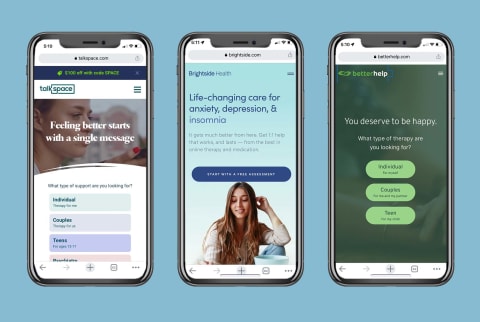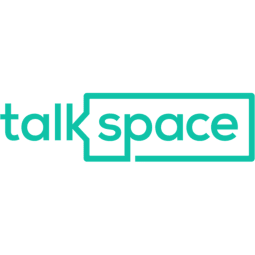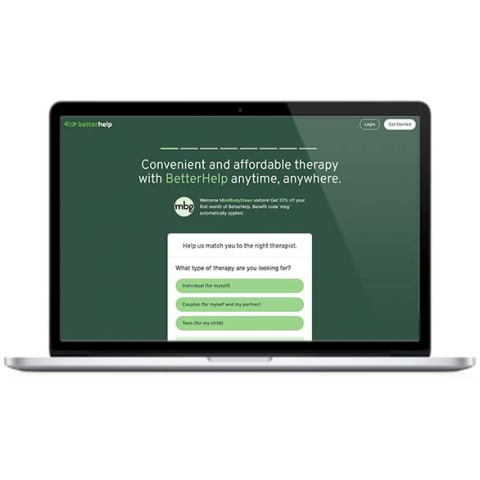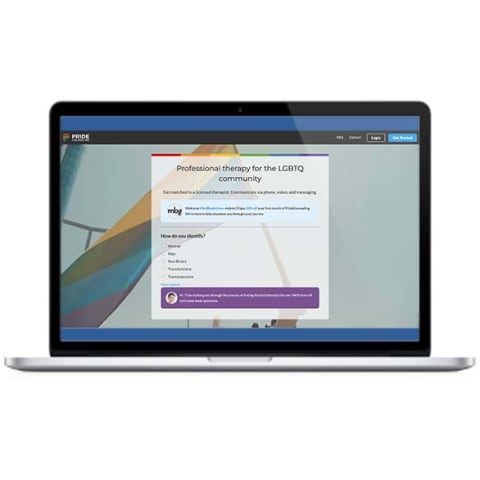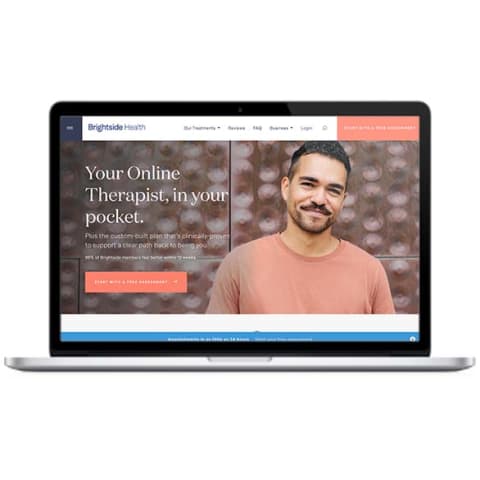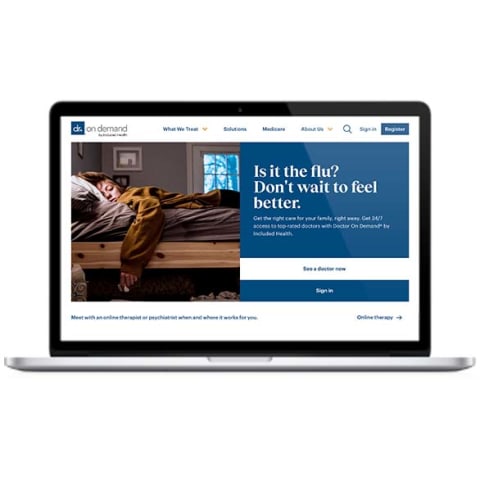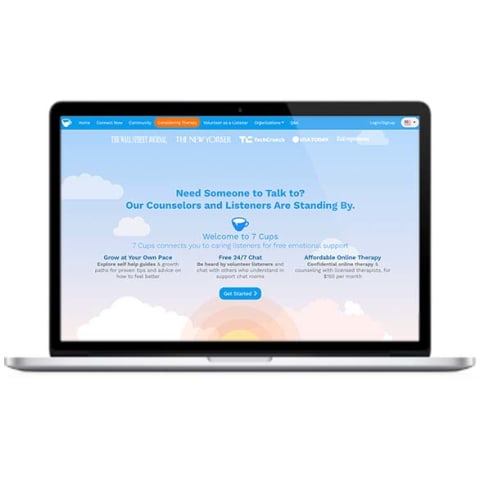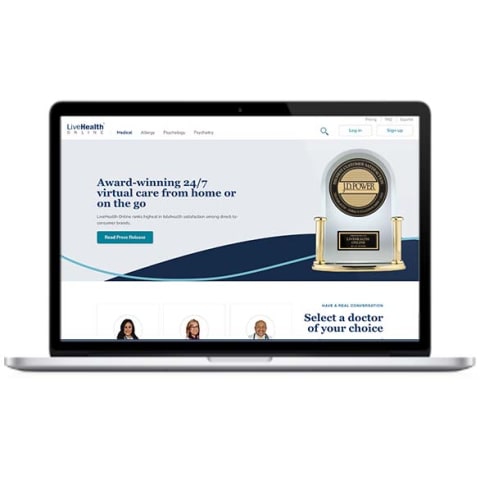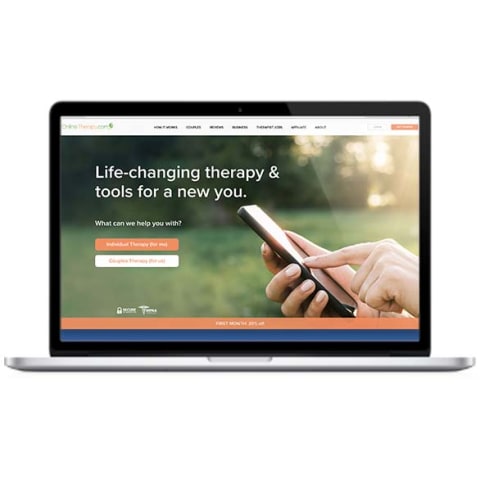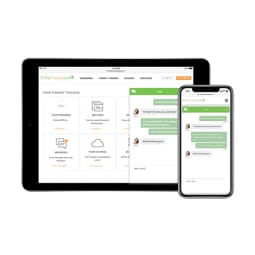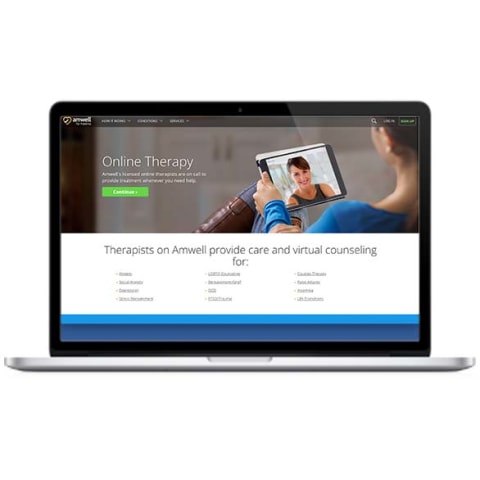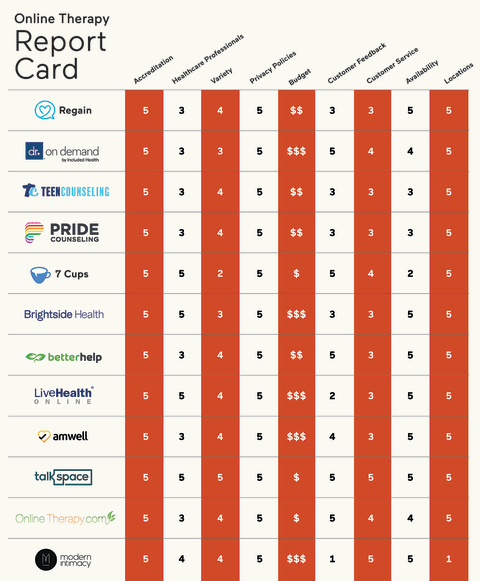With options to talk, text, or video chat with your online therapist, you can’t beat the convenience of therapy from your own home. As access to therapy continues to improve, the United States has seen an increase in the number of people open to receiving mental health treatment online. In fact, a 2022 public opinion poll by the American Psychiatric Association found that nearly four in 10 Americans have used telehealth services to meet with medical or mental health professionals. Whether in person or online, finding the right therapist can be a feat in itself. To answer all your burning therapy questions and help you get the most out of your online therapy sessions, we spoke with licensed experts, researched the most reputable providers, and rounded up the best online therapy services of 2023. Below, find our top picks, along with advice on how to choose the best online therapy provider for your needs, straight from the experts. Each online therapy service boasts its own features and processes, but generally there will be a detailed intake process prompting you to share a bit more about your experience with therapy and what you are hoping to achieve or work on during your sessions. From there, you will either choose a therapist or be assigned one based on your preferences. If you find that your appointed therapist does not meet your needs, there is typically an option to be reassigned. Some online therapy sites offer a free trial or consultation, and most are subscription-based and billed on a weekly or monthly basis. Keep in mind, unless you are using an online therapy site with psychiatrists, you will not have access to prescribed psychotropic medication. While a few services do specialize in one specific form of therapy, many online therapy providers offer a variety of modalities and types of therapists. Kristie Overstreet, Ph.D., LPCC, LMHC, LPC, CST, also emphasizes that online therapy is a good option for “anyone who needs the flexibility to have sessions from anywhere and wants to work on an area of growth that can be effectively addressed virtually.” Balestrieri goes on to say that online therapy can be great for almost everyone, but she recommends speaking with your online therapist to determine whether in-person sessions would be recommended. “For folks struggling with some, more acute, mental health needs, in-person sessions may be temporarily or indefinitely recommended, due to needs that online therapy cannot address,” she elaborates. “Effectiveness depends on the client’s needs, background, and goals,” Overstreet says. “Also, it depends on the therapist’s experience, training, and ability to connect with the client in a virtual space.” Therapy can be a lot like dating: You might not click with the first therapist you meet, but that doesn’t mean therapy won’t be effective for you. Think about what your goals are for therapy, what you are looking for in a therapist, and what effective therapy means to you. Once you have a better understanding of your desired outcome and how you will measure success, you’ll be more likely to find a therapist that fits your needs and can help you achieve the results you desire. That being said, research also suggests that online therapy can be just as effective as in-person sessions. A 2017 study1 found that internet-based cognitive behavioral therapy was just as effective for the treatment and management of various psychiatric disorders—it was also more cost-effective and provided access to rural areas where this type of mental health care may not be accessible. While some sessions might be phone calls, video calls offer the most similar setting to in-person therapy, giving your therapist the ability to pick up on nonverbal cues. “Make sure you have decent lighting and that your therapist can see a good portion of your upper body, not just your face,” Balestrieri says. She also recommends communicating regularly with your therapist about how you feel things are going. “Your online therapist can help you process what you like or don’t about the experience of online therapy and can help you identify adjustments that can help you feel more comfortable, if that is what you need.” Overstreet stresses the importance of being prepared for your session to make sure you’re getting the most out of your time with your therapist. “Make a list of questions you want to ask and goals you want to work on,” she suggests. “This will help you feel more comfortable and prepared when the session starts.” Some questions she recommends are: Have you worked with other clients who have experienced this? How often should we meet? What can I work on between sessions to help me reach my goals? What if I have a question between sessions? Balestrieri adds, “In your first session, it’s important to ask any and all questions you may have about the therapist; the process of therapy, billing, and insurance; and how they might approach your goals for therapy, just like in-person therapy.” The consultation is a great time to bring up any concerns or questions you might have about confidentiality or security. “You might also ask the therapist how they handle technology blips (poor internet, etc.,) or how best to set up your space for a comfortable and confidential experience,” Balestrieri continues. Like any relationship, you want to set the tone for open communication. This will help ensure that you feel comfortable asking questions and approaching difficult topics throughout your future course of therapy, be it short term or long term. Licensed professional counselors (LPC): These therapists have a master’s degree in counseling and can help with many issues—including substance abuse, behavioral concerns, and mental health struggles—but they may not have as much training in mental health as an LMHC. Licensed mental health counselors (LMHC): Licensed mental health counselors can address a number of concerns, such as depression, anxiety, stress management, addiction, and more. These professionals have completed licensure requirements (such as exams, supervised fieldwork, etc.) and cannot prescribe medication but can offer counseling and diagnosis. Marriage and family therapists (LMFT, MFT): The “L” represents completion of licensure requirements such as exams and supervised fieldwork. Marriage and family therapists typically work with couples and families and cannot prescribe medication but can provide counseling and diagnosis. Social workers (LCSW, MSW, LGSW, LCSW, LMSW, LCSW-C, LISW, LSW): Any social workers with an “L” in front of their title have completed licensure exams and fieldwork qualifications. Social workers cannot prescribe medications but can provide counseling and diagnosis. Psychologists (Ph.D., PsyD, EdD, M.A., or M.S.): Have completed a Ph.D., PsyD, EdD, or master’s program in psychology, including extensive clinical field experience. Psychologists have many different specialties and cannot prescribe medications. Psychiatrists (M.D.s or D.O.s): Psychiatrists have a medical degree and can diagnose conditions and prescribe medication, as well as provide various forms of psychotherapy. One important thing to consider, however, is your surroundings. “What can complicate confidentiality is the client’s setting,” Baliestri explains. “Some folks may not have as much privacy in their own homes or choose to have their session in semiprivate spaces, like their car or a room at work.” So, while you should never have to worry about your therapist breaking confidentiality, make sure to consider the environment in which you conduct your online sessions. Not sure how to curate a private space? Baliestri recommends discussing it with your therapist during your consultation. Oftentimes, they will be able to help you come up with the best solution. Baliestri also reminds us that “no online platform is 100% safe from being hacked.” That said, “Most online therapists use client portals and platforms that have extra security and are HIPAA compliant,” she assures. Her advice is to ask your therapist about how they protect your data and video sessions so you can gain peace of mind in your sessions. From the moment your provider is selected, you’ll feel supported. The app supports 24/7 messaging capabilities and provides an estimated response time whenever you send a message. Note, responses are only guaranteed on weekdays. Through the app, you can track your goals and progress and access additional mental health resources. Talkspace has a few plans to choose from, depending on what level of support you are looking for. The “plus” plan gives you text, video, and audio messaging capabilities; the “premium” plan offers all that plus one 30-minute live session per month; and the “ultimate” plan includes unlimited messaging and four 30-minute live sessions per month. There is a psychiatry branch, Talkspace Psychiatry, which focuses primarily on medication management and is separate from the online therapy plans. Cost: $65 per week Therapy sessions on BetterHelp can be phone calls or video chats. Between appointments, you’ll have unlimited messaging access to your therapist. Our testers began messaging with their therapists even before their initial session, which helped them build a connection and feel more comfortable heading into the appointment. Not all providers offer video sessions, so be sure to make note of your preferences and double check with your appointed therapist if that’s something you are looking for. If you think you can’t have life-changing breakthroughs in online therapy, think again. Our full BetterHelp review dives deeper into why even someone who has gone to in-person therapy for years was a fan of BetterHelp. Cost: $60 to $90 per week, billed every four weeks Owned by BetterHelp, Regain is an online therapy provider designed specifically for couples. The platform gives users access to licensed professionals, with specialization in couples therapy. When you sign up, you’ll complete a full questionnaire to indicate which areas you’d like to work on, as well as any preferences you have for specific certifications and methods of communication. As with all BetterHelp brands, your therapist will be assigned to you based on the criteria you outline at sign-up. Regain makes it simple to change your therapist if you don’t find the first one to be a good match, but you will never be given the option to choose a specific therapist. That said, it’s important for both you and your partner to connect with your therapist, so we recommend giving it a few sessions and then discussing with your partner to see how you are both feeling. Regain offers live video sessions, with messaging access to your therapist between sessions. While every session focuses primarily on relationships, there is the option for one partner to start ahead of the other—and there will never be an extra charge for a partner joining. Regain does not currently accept insurance, and lands in the middle of our pricing scale. Cost: $60 to $90 per week Teens from 13- to 19-years-old can use TC to work through issues, such as stress, anxiety, depression, eating disorders, or bullying. Once the parent completes the signup process to match their child with a licensed counselor, each session will be confidential between the teen and the therapist. While the therapist is required to report any sign of abuse or if the teen is thought to be a danger to themselves or others, parents will otherwise not have access to anything discussed in these therapy sessions. Each of these counselors specializes in helping teenagers, but they cannot provide a diagnosis and the service is not meant for emergency situations. Cost: $60 to $90 per week, billed every four weeks Your session can be a phone call, video call, or live chat, depending on what you and your therapist prefer. In between sessions, you’ll have 24/7 access to private chat rooms for messaging. While the app provides extensive access to therapists and licensed professionals, it is not meant for urgent crises or emergency situations. It is also not suitable for minors or court-ordered therapy. Cost: $60 to $90 per week, billed every four weeks Brightside uses a proprietary data-driven technology, PrecisionRX, to analyze patients and recommend medication options to the provider. In 2022, the brand funded and co authored a study with medical science journal, Cureus, which found that patients who received care from Brightside experienced a significantly higher reduction in symptoms than those who received treatment as usual. One downside of this service is that a few of the site’s therapists have fairly limited availability when it comes to scheduling. On the bright side (pun intended), the signup process tends to be quite fast. You will typically be matched with a therapist within one business day. Through your subscription plan, you’ll have messaging access with your therapist or psychiatrist. Just keep in mind that all sessions are video calls—there is no option for audio phone calls or live chat. Cost: $95 per month for medication management; $349 per month for therapy & medication; pharmacy copay per prescription One major selling point for this platform is that it accepts a number of different insurance plans. Our pricing refers to out-of-pocket rates, for those who do not have insurance coverage. While this is one service that does not offer chat or email support, the therapists have availability seven days a week for video chat sessions. And because the site only has psychologists and psychiatrists, you can feel confident that your provider has undergone an extensive amount of training. Anyone who is new to therapy will appreciate the helpful resources on the Dr. On Demand website, outlining various symptoms and sample treatment plans. Signing up for therapy can be overwhelming, but this level of detail helps give a better understanding of what to expect. This provider is also very detailed in outlining the privacy and confidentiality parameters and gives patients the ability to choose their own therapist, versus other service’s method of automatically pairing you up based on a survey alone. Cost: 25 minutes for $129; 50 minutes for $179; $299 for initial visit Along with therapy services and unlimited messaging, 7 cups also provides various self-help resources such as videos and worksheets to dive deeper into your mental health journey. While the chat rooms are free, there are no mental health professionals in these rooms. To work with a licensed therapist, you’ll need a monthly membership ($150/month). Keep in mind, you will not have traditional therapy sessions, and instead will have the ability to message your therapist as often as you’d like in a private chat room. Your therapist will then reply once or twice a day, on weekdays only. Cost: $150 per month for access to therapists; free for chat rooms All that said, LiveHealth Online has an incredibly simple (and free!) sign-up process and makes it easy to access mental health professionals, including psychiatrists and a range of licensed therapists. Since there are psychiatrists available, medications can be prescribed. You’re also able to choose your provider based on individual preferences and easy-to-view upcoming availability, as opposed to being matched up with a therapist automatically. While there are not any extras such as guides, courses, chat rooms, and journals, this is a straightforward and reliable platform for anyone seeking talk therapy or medication. Just note, the only communication is through your video sessions. Cost: $80 to $95 per session; up to $175 for first psychiatry session; $75 for follow-up psychiatry session The service itself is very easy to use, whether on-site or on the app. There are different types of therapists available on Amwell, including psychiatrists who can prescribe medications. And, if you’re looking for a more holistic experience, you can use Amwell for other forms of healthcare, too, not just therapy. It’s worth mentioning that there are no messaging or texting options on Amwell—so, if you’re looking for more frequent support between sessions, this is probably not the right pick for you. While there are not many online therapy services that accept insurance, Amwell is one of them and accepts many insurance plans. Cost: $109 for therapist with a master’s; $129 for therapist with a Ph.D. While Online-Therapy.com does have a specialized focus, it truly is a holistic experience. Through your membership, you’ll have access to a slew of mental health resources: worksheets, yoga, meditation, weekly live chats with a therapist, an online journal, and unlimited messaging capabilities. Just keep in mind, while you can message any time, the therapists are typically only available on weekdays during business hours. This platform is a great choice for anyone looking to embark on a self-discovery journey through a well-rounded approach (of course, with a deep focus on CBT). It’s not for you if you’re seeking a different form of therapy, or if you want to be prescribed medication. Insurance is not accepted, but the cost is on the low end of our pricing scale. Cost: $40 to $80 per week Modern Intimacy offers a free 30-minute phone consultation, during which you can ask any question you have to determine whether it’s the right service and provider for you. From there, you’ll see your therapist via video sessions, and will pay per appointment. Every Modern Intimacy practitioner is highly trained and educated and will help you work through any relational or individual issue using different methods of talk therapy, research-sharing, and homework assignments. If you are looking for an online service with therapists who will hold you accountable, this is a great choice. It’s important to note that Modern Intimacy is only available to Florida, Illinois, Colorado, California, and New York residents. Cost: $150 to $300 per session



